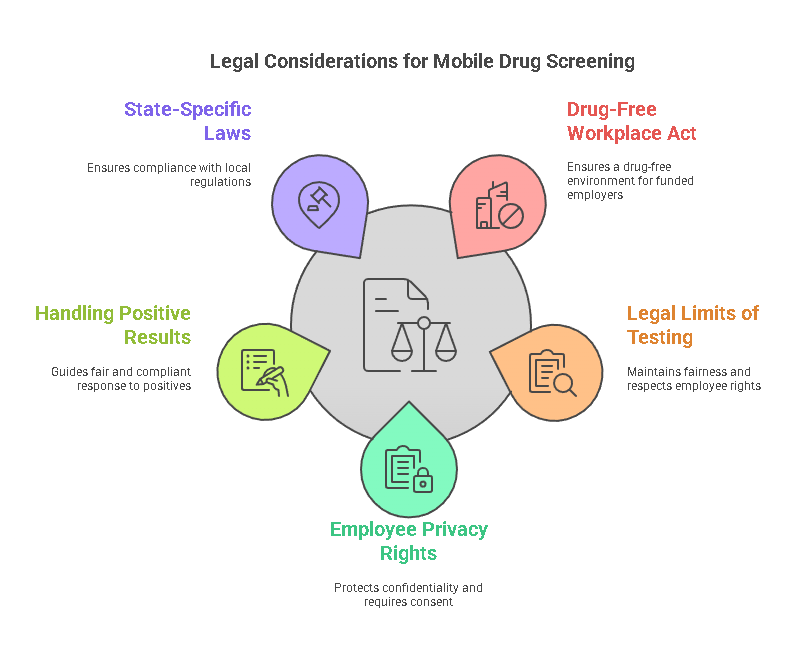How Mobile Drug Screening Can Improve Workplace Safety and Compliance
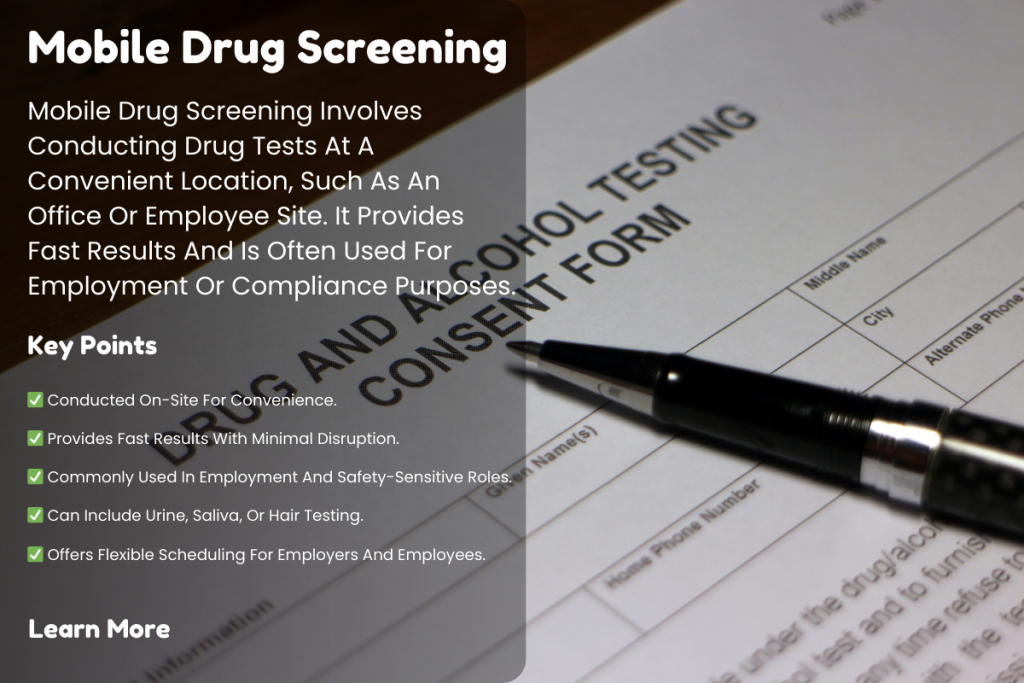
What Is Mobile Drug Screening?
Mobile drug screening refers to a convenient and efficient way of conducting drug tests outside of traditional laboratory settings. Unlike conventional drug testing methods that require individuals to visit clinics or labs, mobile drug screening brings the testing process directly to the workplace, construction sites, or other locations. These services are designed to be flexible, allowing organizations to maintain their drug-free workplace policies without disrupting productivity or operations.
Mobile drug screening can include a variety of testing methods, including urine tests, saliva tests, hair follicle tests, and even breathalyzer tests. The most common method is urine testing, as it provides a quick and reliable result, but different testing methods are selected based on the specific needs and circumstances of the employer or organization. The key benefit of mobile drug screening is its convenience—organizations no longer have to send employees off-site for testing, saving time and reducing workplace downtime.
Why Use Mobile Drug Screening?
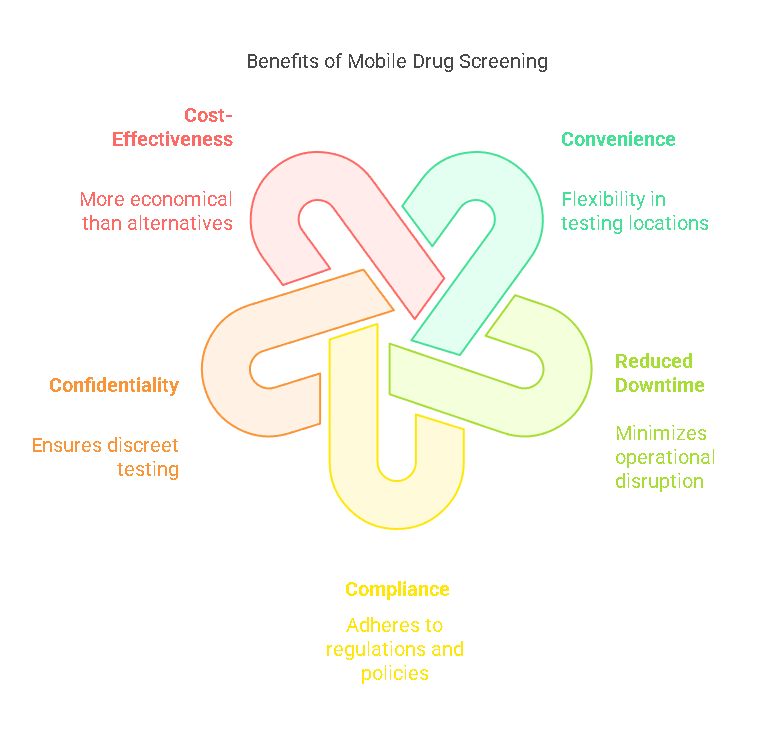
There are several reasons why employers and organizations are increasingly opting for mobile drug screening services. Some of the primary benefits include:
- Convenience for Employers and Employees
Mobile drug testing offers the flexibility of conducting tests at any location, whether at the office, construction site, or any other facility. Employees no longer need to take time off or travel to a testing center, making the process quicker and easier for everyone involved. - Reduced Downtime and Increased Productivity
Mobile drug screening minimizes the disruption to daily operations. Employees can take the drug test on-site and immediately return to their tasks, ensuring that productivity is not hindered. For industries with high labor needs, such as construction or transportation, this is a critical factor in keeping operations running smoothly. - Compliance with Regulations and Company Policies
Mobile drug screening helps ensure compliance with the Drug-Free Workplace Act, occupational safety regulations, and any other local, state, or federal requirements. By performing random drug testing or pre-employment screenings, companies demonstrate their commitment to a safe and drug-free environment. - Confidentiality and Privacy
Privacy is always a concern when it comes to drug testing. Mobile drug screening offers a more discreet process, as testing can be done in private areas away from the main workforce. This helps reduce the stigma that might be associated with drug testing in public areas and maintains employee morale. - Cost-Effective
Mobile drug screening services are often more cost-effective than establishing an in-house testing facility or requiring employees to visit a medical clinic. By eliminating the need for transportation and administrative overhead, employers can save money while ensuring that their drug screening policies are being followed.
How Does Mobile Drug Screening Work?
The process of mobile drug screening is designed to be straightforward and convenient. Here’s an overview of how it typically works:
- Scheduling the Test
The first step in the process is scheduling the drug screening test. Employers can arrange mobile drug screening through service providers like Precisehire, which offer customizable testing solutions tailored to their needs. Tests can be scheduled on an ad-hoc basis or set up as part of a routine program (e.g., pre-employment or random testing). Scheduling can often be done online or by contacting the service provider directly. - Arrival of the Mobile Unit
Once the test is scheduled, the mobile unit, equipped with all necessary tools and supplies, arrives at the designated location. This mobile unit can be a van or a portable set-up that is fully stocked with the necessary testing kits, such as urine cups, saliva swabs, or breathalyzers, depending on the type of test being administered. - Sample Collection
Once the mobile unit is on-site, trained professionals conduct the drug test. For urine tests, employees provide a urine sample, which is then tested on-site or sent for laboratory analysis. For saliva or breathalyzer tests, the process is quick, and the results are often available immediately. In some cases, hair follicle tests may be conducted, although they require more time for analysis and typically need to be sent to a laboratory for results. - Results and Reporting
The results of mobile drug screening vary depending on the type of test. Urine, saliva, and breathalyzer tests can often provide instant results, while hair follicle tests may take a few days. Instant results are typically shared on the spot, with a formal report provided within a short timeframe. If the test is sent to a lab, the results may take several days to return, but this is usually communicated upfront.
Mobile drug screening companies, like Precisehire, provide employers with detailed reports that outline test results, ensuring transparency and compliance with workplace drug policies. In case of a positive result, further action, such as additional testing or disciplinary measures, may be recommended.
Types of Drug Tests in Mobile Screening
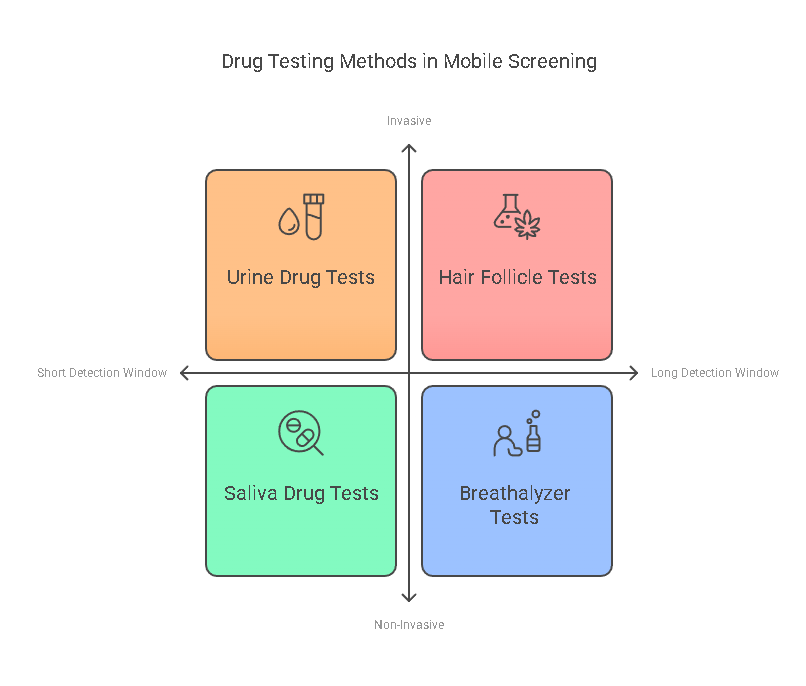
Mobile drug screening can involve various types of tests, each with its unique advantages and limitations. Here are some of the most common drug tests used in mobile screening:
- Urine Drug Tests
Urine testing is the most widely used method for mobile drug screening. It is simple, effective, and able to detect a broad range of drugs, including marijuana, cocaine, opiates, amphetamines, and more. It is often used for pre-employment testing and random testing. The results are available quickly, making it an ideal choice for on-the-spot testing. - Saliva Drug Tests
Saliva testing is another popular method for mobile drug screening. Saliva tests are typically used for detecting recent drug use, as they have a shorter detection window compared to urine tests. They are non-invasive and easy to administer, making them convenient for workplace testing. However, saliva tests may not detect drugs used several days prior. - Hair Follicle Tests
Hair follicle testing offers a longer detection window and can identify drug use over an extended period, usually up to 90 days. This method is more expensive and takes longer for results to be processed, but it is highly effective for detecting long-term drug use. - Breathalyzer Tests
Breathalyzer tests are primarily used to detect alcohol consumption in real-time. They are commonly used in workplaces where employees may operate heavy machinery or vehicles and where alcohol use can be a safety concern. Breathalyzer tests provide immediate results, making them ideal for ensuring workplace safety.
Mobile Drug Screening for Different Industries
Mobile drug screening is especially beneficial for industries that require frequent or random drug testing. Some industries that frequently use mobile drug testing services include:
- Construction: Workers in the construction industry are often required to undergo drug testing due to the physically demanding nature of their jobs and the importance of safety on-site.
- Transportation: Companies in the transportation industry, including trucking, are often required to conduct drug testing for their drivers to comply with federal regulations.
- Healthcare: Healthcare workers may be tested regularly to ensure a drug-free workplace, especially in roles that involve patient care.
- Manufacturing: Many manufacturing facilities implement mobile drug testing to maintain safety standards and reduce workplace accidents.
Mobile drug testing provides a flexible solution for these industries by offering on-site testing without disrupting operations.
Types of Mobile Drug Screening and Advantages
Types of Mobile Drug Tests
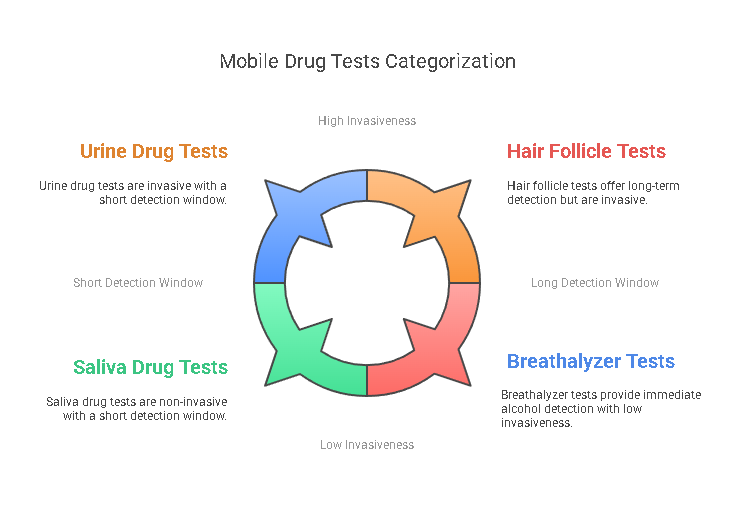
Mobile drug screening offers several types of drug tests, each suited for different purposes and scenarios. These tests allow businesses to choose the most appropriate method based on their unique needs, whether it’s for pre-employment screening, random testing, or post-incident testing. Below are the most common types of drug tests used in mobile drug screening:
1. Urine Drug Tests
Urine drug tests are the most widely used in mobile drug screening due to their effectiveness, reliability, and ability to detect a broad range of drugs. The process involves collecting a urine sample from the individual being tested, which is then analyzed to check for the presence of illicit substances.
- Drugs Detected: Marijuana, cocaine, opiates, amphetamines, methamphetamines, and other substances.
- Detection Window: Urine tests can detect drugs in the system from several days to up to a week, depending on the substance.
- Advantages:
- Quick results, particularly when the test is processed on-site.
- Reliable for detecting a broad spectrum of drugs.
- Limitations:
- Can be manipulated or diluted by the individual.
- Some drugs, such as marijuana, may remain detectable for extended periods, leading to false positives in some cases.
Urine drug tests are often utilized for pre-employment screening and routine random testing in workplaces.
2. Saliva Drug Tests
Saliva drug testing is a non-invasive method that provides a quick and simple way to test for recent drug use. It is widely used for on-the-spot testing, especially when employers need immediate results.
- Drugs Detected: Marijuana, cocaine, opiates, amphetamines, and alcohol.
- Detection Window: Typically 1-2 days for most substances, but alcohol can be detected for up to 24 hours.
- Advantages:
- Simple and non-invasive; only requires a small sample of saliva.
- Can provide instant results, particularly with some types of saliva testing kits.
- Harder to tamper with compared to urine tests.
- Limitations:
- Less effective for detecting long-term drug use.
- May not detect substances used several days ago.
Saliva tests are especially useful in environments where immediate results are crucial, such as industries that require high safety standards.
3. Hair Follicle Tests
Hair follicle testing provides a long-term view of an individual’s drug use. It detects drug use over a much longer period, often up to 90 days. This method is typically used when employers are concerned about chronic drug use.
- Drugs Detected: Marijuana, cocaine, opiates, amphetamines, PCP, and other long-term drug use.
- Detection Window: Up to 90 days, which makes it ideal for detecting long-term or habitual drug use.
- Advantages:
- Can detect drug use over a much longer period compared to urine or saliva tests.
- Difficult to tamper with, making it a reliable method for detecting chronic drug use.
- Limitations:
- More expensive than urine or saliva testing.
- Results take longer to process and typically require lab-based analysis.
- May not detect drugs used in the past 7-10 days.
Hair follicle tests are typically used when there is a need to investigate long-term drug use, such as in post-incident drug testing or for pre-employment screenings where a comprehensive drug history is needed.
4. Breathalyzer Tests
Breathalyzer tests are primarily used for detecting alcohol use. These tests provide real-time results, making them ideal for employers in industries where employees operate vehicles or heavy machinery.
- Drugs Detected: Alcohol.
- Detection Window: A few hours, depending on the individual’s metabolism and alcohol consumption.
- Advantages:
- Immediate results, providing employers with instant information about alcohol use.
- Non-invasive and simple to administer.
- Limitations:
- Only detects alcohol use and not other substances.
- Cannot detect impairment from other drugs, such as marijuana or cocaine.
Breathalyzer tests are particularly useful for companies that want to monitor alcohol consumption and ensure employees are fit for duty.
Advantages of Mobile Drug Screening for Employers
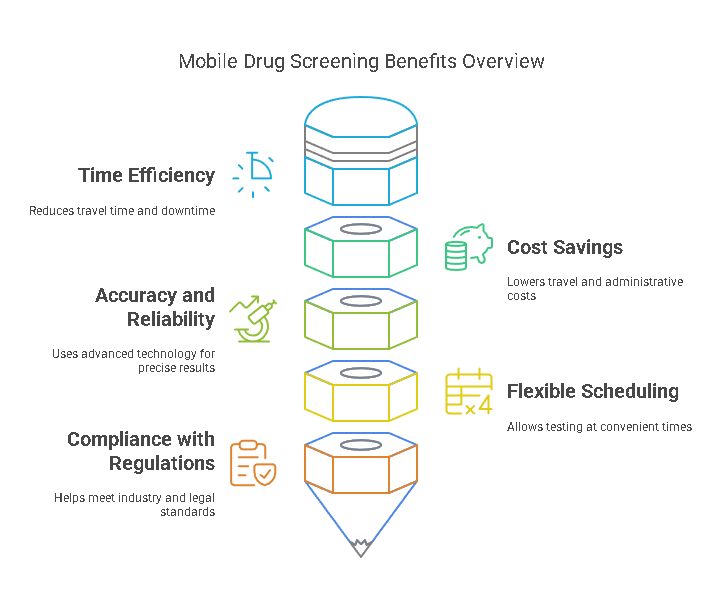
Mobile drug screening services offer numerous benefits to employers looking to maintain a safe, compliant, and productive workforce. The ability to conduct tests on-site allows businesses to reduce downtime and improve overall efficiency. Here are some of the key advantages:
1. Time Efficiency
Mobile drug screening significantly cuts down on the time employees would typically spend traveling to a testing facility. This saves both time and money, ensuring that employees can get back to their jobs faster. The mobile units come equipped with the necessary testing kits and can perform the tests on-site, reducing unnecessary downtime.
- Reduced Absenteeism: Employees don’t need to leave the workplace for testing, minimizing the time spent away from their duties.
- Faster Results: Many mobile drug screening services offer instant results for certain tests like saliva or breathalyzer tests.
2. Cost Savings
Though there may be an upfront cost for mobile drug screening, the long-term savings are significant. Mobile drug testing helps reduce the costs associated with lost productivity and employee downtime.
- No Travel Costs: Employees don’t need to go to a separate testing facility, which means no additional travel or accommodation costs for the employer.
- Reduced Administrative Costs: The mobile units handle all aspects of the testing process, from scheduling to reporting results, which means less administrative work for HR departments.
3. Accuracy and Reliability
Mobile drug testing services use the latest technology to ensure accurate and reliable results. Whether the test is being conducted on-site or analyzed in a lab, the equipment used by mobile drug testing providers is designed to meet high standards of accuracy.
- State-of-the-Art Equipment: Mobile testing units come equipped with advanced devices and equipment to ensure the highest level of precision.
- Certified Laboratories: Some mobile services offer the option to send more complex tests (such as hair follicle tests) to certified labs for in-depth analysis, ensuring complete accuracy.
4. Flexible Scheduling
With mobile drug screening, employers have the flexibility to schedule tests at times that are most convenient for their operations. This means that drug testing can be performed during off-hours or in shifts to minimize disruption to productivity.
- Convenient Timing: Tests can be conducted during non-peak times, such as at the beginning or end of shifts, or even on weekends.
- Multiple Locations: If a business operates in multiple locations, mobile drug testing units can travel to each site, ensuring a consistent and fair testing process across all workplaces.
5. Compliance with Regulations
Many industries require drug testing to meet safety and regulatory standards. Mobile drug screening services help businesses comply with these regulations by providing flexible and reliable testing options. Mobile units also assist in maintaining documentation and accurate records of testing procedures, which is crucial for legal and regulatory compliance.
- Compliance with Drug-Free Workplace Act: Mobile drug screening services can ensure that businesses meet the necessary requirements for a drug-free workplace.
- Tailored to Industry Standards: Whether for transportation, construction, healthcare, or manufacturing, mobile drug testing services can be customized to meet industry-specific regulations.
Challenges of Mobile Drug Screening
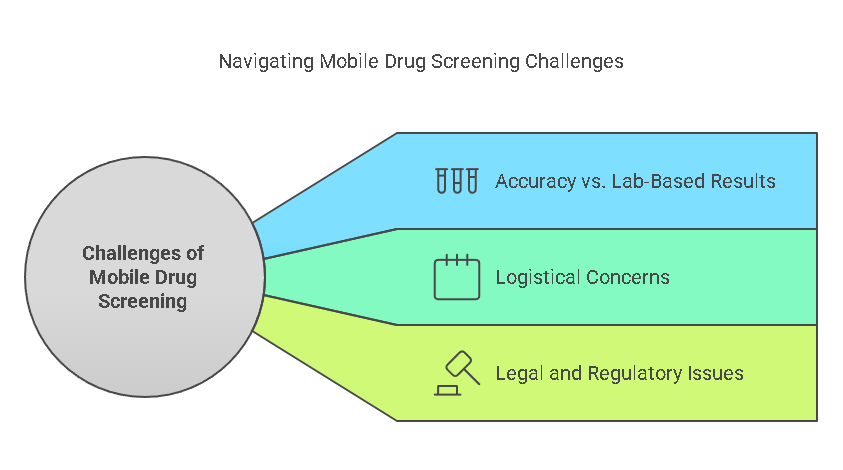
While mobile drug screening offers numerous benefits, there are some potential challenges to consider when integrating this service into a business.
1. Accuracy vs. Lab-Based Results
Some mobile drug testing methods, such as urine or saliva tests, may not be as accurate as lab-based tests. False positives or negatives can occasionally occur. However, by working with reputable mobile screening providers who use certified testing equipment, employers can reduce the likelihood of inaccuracies.
2. Logistical Concerns
Coordinating mobile drug testing across different shifts, job sites, or departments can be a logistical challenge. Employers need to ensure that the mobile unit is available when needed and that employees are available for testing.
3. Legal and Regulatory Issues
Employers must be aware of legal and regulatory requirements in their state or industry regarding drug testing. These regulations may dictate when and how testing can be conducted, how test results are managed, and how positive results are handled. Ensuring compliance is essential to avoid potential legal challenges.
Precisehire’s Mobile Drug Screening Services
At Precisehire, we offer comprehensive mobile drug screening services tailored to the needs of businesses of all sizes. Our mobile drug testing solutions are flexible, efficient, and designed to ensure compliance with industry regulations. With fast turnaround times and a range of testing methods, we can provide the ideal solution for employers seeking convenience, accuracy, and cost savings in their drug testing programs.
We understand that every business has unique requirements, and we are committed to offering customizable options that meet the specific needs of our clients. Our services are designed to ensure that your company maintains a drug-free workplace, while minimizing downtime and increasing productivity.
Below is a comparison of mobile drug testing options available through various methods:
| Method | Timeframe | Cost | Ease of Access |
|---|---|---|---|
| Urine Drug Test | Instant to 1-2 hours | Varies | Easy |
| Saliva Drug Test | Instant | Varies | Easy |
| Hair Follicle Test | 2-3 days | Moderate to High | Moderate |
| Breathalyzer Test | Instant | Low to Moderate | Very Easy |

